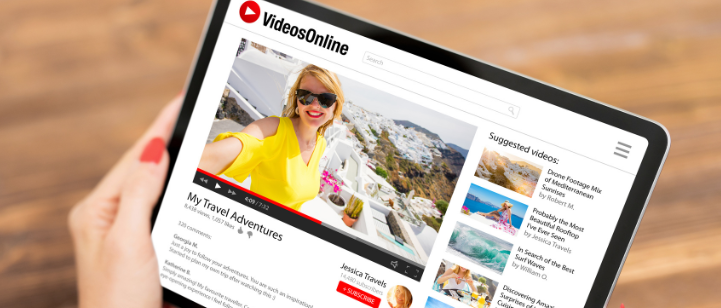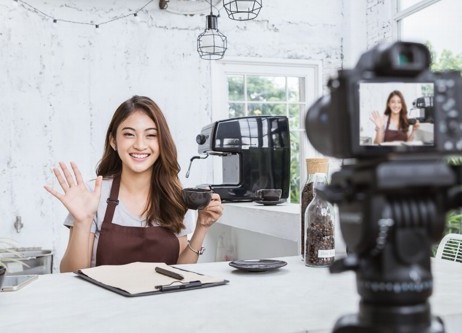
Think about the following questions.
1. Do you follow or watch any social-media influencers? Who are they?
2. How do you think they influence you? What do you learn from them?
3. Do you think they have a different impact than celebrities like actors or singers? If so, how?
VOCABULARY PREVIEW
Match each New Academic Word List(NAWL) word with the correct definition.
- degrading
- discourse _____
- conservation _____
- magnitude _____
- circulate _____
- shallow _____
- a. lacking in emotional or intellectual depth
- b. to send information or ideas from one person to others
- c. communication in speech or writing
- d. the protection of plants, animals, or natural areas
- e. the size or importance of something
- f. making people feel ashamed or that they have no value
UNDER THE INFLUENCE

The past two decades have seen the rise of a new type of celebrity. Their fame comes from their ability to entertain fans and influence viewers with their opinions and recommendations. These celebrities are known as social-media influencers, and they've become an essential part of youth culture as both role models and spokespeople1.
Social-media influencers have done much to change how people interact with one another. They've also helped change how companies, governments, and industries interact with us. For most people, influencers are sources of entertaining and informative2 content about topics such as fashion or video games. But others see them in a much less positive light. Many critics believe that influencers can quickly become negative role models because they frequently act poorly in stream and in public. For example, the YouTuber PewDiePie has been called out several times for making racially3 charged comments in stream. But not all influencers are simply acting out for the camera. Some use their celebrity to create discourse and spread messages of positivity4.
People often criticize social media for contributing to a growing sense of superficiality5 in society. By using filters and beauty applications such as Facetune, content creators6 can create a "perfect" version of themselves. These beauty applications have been criticized for being shallow and for pressuring people to try and obtain an impossible standard of beauty. In response, some influencers promote body positivity. Body positivity is a social movement meant to stop people's growing sense of dissatisfaction with their appearance. Its purpose is to empower7 individuals and challenge the ways in which society views and presents the physical body. It promotes all body types no matter their shape, size, race, gender8, or appearance. The movement, which started small, is now supported by many social-media influencers and "traditional" celebrities, including Alicia Keys, Jameela Jamil, and Demi Lovato.
Social media isn't used just for entertainment; it's also used to share ideas. Unfortunately, though, some of these ideas are damaging and promote hate. But for every hate-filled and degrading post, there are those who counter9 by promoting equality, understanding, and healing. In 2020, the Black Lives Matter (BLM) movement, which started in 2013, gathered huge public attention following George Floyd's death in Minneapolis. With the help of many influencers, the movement generated over 11.8 million engagements (likes, shares, and comments) on Instagram. The magnitude of public attention given to the movement even brought in corporate support. Companies such as Walmart, Nike, H&M, and others, went on to promise large donations10 to the BLM movement.
Social-media influencers also circulate information about global concerns such as global warming and wildlife conservation. Their efforts are further advanced thanks to traditional celebrities, such as Leonardo DiCaprio, Mark Ruffalo, and Billie Eilish, who have posted on social media in support of the fight against climate change. Influencers such as Greta Thunberg have used social media to great effect and have even helped to create real change by inspiring people to make donations and change policies.
Influencers may be a relatively new form of celebrity, but their reach is just as broad as that of a traditional celebrity. One might even argue that their influence goes further because they connect more with their fans. Their words carry weight, and when they're used appropriately, they can influence people to change the world for the better.
New Academic Word List
- spokesperson 1 : n. a person who is chosen to speak for a group or organization
- informative 2 : adj. providing a lot of useful information
- racially 3 : adv. in a way that is based on someone's race, especially when this is unfair or harmful
- positivity 4 : n. the quality of having a positive attitude
- superficiality 5 : n. the fact of being shallow; not thinking about serious issues
- creator 6 : n. a person who makes something new
- empower 7 : v. to give someone the freedom, strength, or authority to do something
- gender 8 : n. the physical or social condition of being male or female
- counter 9 : v. to state an opposing or different view
- donation 10 : n. money or goods that are given for free to help a person or group of people
READING COMPREHENSION
A ‣ Mark each statement as true (T) or false (F) according to the reading.
- Online celebrities have made businesses communicate with us differently.
- True
- False
- People believe apps like Facetune encourage people to think too deeply.
- True
- False
- Jameela Jamil and two other celebrities started the body positivity movement.
- True
- False
- Instagram donated large amounts of money to BLM.
- True
- False
- Traditional celebrities are leading campaigns against climate change.
- True
- False
B ‣ Choose the best answer according to the reading.
- What does the reading mainly discuss about influencers?
- a. How they make money from their posts, comments, and content
- b. How they are now replacing traditional celebrities
- c. How they can affect society with the things they say
- d. How they can save the environment with the things they say
- What is NOT true about the body positivity movement?
- a. It is supported by traditional celebrities and social-media influencers.
- b. It aims to provide tools to help people reach a high standard of beauty.
- c. It is working to change society's attitude toward the human body.
- d. It wants to help people feel more satisfied about the way they look.
- In paragraph 4, the word generated is closest in meaning to _____.
- a. promised
- b. posted
- c. promoted
- d. produced
- What can be inferred about companies like Walmart, Nike, and H&M?
- a. They educated social-media users about BLM by posting about it.
- b. They added likes, shares, and comments to BLM accounts.
- c. They led a campaign to bring BLM to the government's attention.
- d. They gave money to BLM because consumers care about the issue.
C ‣ Fill in the blanks with information from the reading.
- Critics say that when influencers act poorly, they become negative _____.
- On social media, likes, shares, and comments are often known as _____.
- The BLM movement began in _____, but received popular support after the death of George Floyd.
SUMMARY
Fill in the blanks with the phrases in the box.
- body positivity
- in stream
- entertain and inform
- feel dissatisfied
- encourage corporations
- circulate damaging
|
Influencers |
|
|
Positive Role Models
|
Negative Role Models
|
VOCABULARY PRACTICE
Fill in the blanks with the words in the box. Change the form if necessary.
- circulate
- conservation
- shallow
- discourse
- degrading
- magnitude
- Nowadays, many corporations want to appeal to customers by supporting environmental _____ .
- Online content can have a huge influence on public _____ .
- Hurtful and _____ posts and comments can be countered by positive and empowering ones.
- Until the 20th century, newspapers were the main way for news to _____ .
- The film I watched last night was really _____ . There was no depth to it at all.
- He didn't realize the _____ of the problem until it was too late.
SUPPLEMENTAL READING
Online Cancel Culture

"Cancel culture" is the practice of removing support from a public figure or company after they've done or said something considered offensive. Many see cancel culture as a force for good. It has helped to fight abuse, racism, and many other kinds of wrongdoing. But others argue that cancel culture goes too far in punishing people and prevents free speech.
The year 2020 saw many famous figures being "canceled." Among them were celebrities such as J. K. Rowling, Jimmy Fallon, Vanessa Hudgens, and others. Another big celebrity cancellation involved actress and MMA fighter Gina Carano. Carano refused to apologize for a series of controversial posts on social media, which eventually led to her being dismissed from Disney+ series The Mandalorian. These included comments offensive to minority groups and posts which cast doubt on the threat of COVID-19. In addition to losing her job, she also lost an agreement with toy manufacturer Hasbro. The toymaker dropped her Mandalorian action figure after she was taken off the show.
Not everyone agreed with Carano's dismissal. Her fans continued to stand behind her. They even created a petition, which had gathered more than 75,000 signatures as of March 2021, for Disney to rehire her. For many of her fans, dismissing Carano was an attack on her right to free speech and an example of cancel culture going too far.
Fill in the blanks with information from the reading.
- Cancel culture can help to fight _____ , such as abuse and racism.
- During 2020, a number of celebrities were _____ because of things they said or did online.
- Carano's fans got together and made a(n) _____ asking that Disney rehire her.






















Leave a comment
Load more